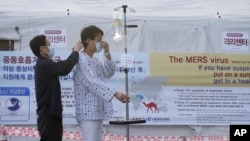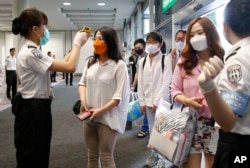In South Korea four deaths related to the Middle East Respiratory Syndrome (MERS) have been reported and the number of infections rose to 41 on Friday.
Two of the newest reported cases are raising concerns that the deadly virus may have spread beyond the more than 1,600 people who have already been quarantined or isolated.
MERS patient number 35 is a doctor who reportedly attended a housing conference and medical seminar in Seoul while he was in a contagious stage, potentially exposing more than 1,000 other people also at the conference.
What Is MERS?
What Is MERS?
- First identified in Saudi Arabia in 2012, Middle East respiratory syndrome (MERS) is a viral respiratory disease.
- Originates from a virus that can cause diseases ranging from the common cold to Severe Acute Respiratory Syndrome (SARS)
- Symptoms include fever, cough and shortness of breath; may advance to pneumonia, gastrointestinal symptoms, diarrhea
- Approximately 36 percent of reported MERS patients die
- Most human cases of MERS have been attributed to human-to-human infections, but the virus does not seem to pass easily from person to person unless there is close contact.
- Source: WHO
South Korea Minister of Health and Welfare Moon Hyung-pyo said Friday the ministry received a list of conference attendees and will investigate.
Moon said they are preparing to impose proper measures, including isolation, after they complete the investigation.
Patient 37 is a South Korean Air Force sergeant who tested positive for MERS at the Osan military base, located 50 kilometers south of Seoul. About 100 people in that area have been asked to stay at home.
The U.S. Air Force also has a large contingent of military personnel stationed at the Osan base but so far no American personnel there have been affected.
Virus may have spread
These two cases however indicate that the deadly MERS virus could have been spread to a much wider population than the 1,600 people who have already been identified and isolated.
MERS was first identified in Saudi Arabia in 2012. It is a respiratory illness that initially produces flu like symptoms but can escalate to pneumonia and kidney failure.
There is no known cure or vaccine. But the virus is not typically very contagious.
South Korean authorities have come under criticism for being slow to react, for not imposing quarantines quickly enough, and for withholding information.
The first Korean patient diagnosed with MERS was a 68-year-old man, who returned to Seoul from a trip to the Middle East in May. After feeling ill, he visited four hospitals before he was correctly diagnosed.
'Super spreader'
Health Ministry officials said this Patient No. 1 was a “super spreader” responsible for infecting 28 of the confirmed MERS cases.
Professor David Hui, the Director of the Stanley Ho Center for Emerging Infectious Diseases in Hong Kong, said a “super spreader” is someone who has the right, or in this case the wrong, combination of pre-disposed conditions to carry the disease.
“In general if the person is of an older age with pre-existing medical illness causing the compromise of the immune status, then the patient’s viral load can be very, very high and he can actually infect many other people,” said Hui.
The majority of MERS cases have been traced back to the second hospital that Patient 1 visited.
Professor Choi Bo-yul with Hanyang University’s department of medicine is part of South Korea’s national MERS taskforce.
Choi said 25 MERS cases can be traced to that hospital and an investigative team has recently found the virus in Patient 1’s hospital room and even in the air conditioning filters.
Choi said they took out five filters from the room and sent them to the Korea National Institute of Health for testing. Out of the five filters, he said, the virus was found on three.
Second hospital named
The Ministry of Health released the name of this second hospital where MERS was found: the Pyongtaek hospital located 80 kilometers outside of Seoul. But so far authorizes have refused to disclose the names of the other hospitals where MERS patients are being treated.
Hong Kong’s Professor Hui disagrees with Seoul’s decision to withhold this information from the public.
During Hong Kong’s experience dealing with SARS outbreak that began 2002, he said, they learned that sharing as much information as possible is the best way to reassure the public.
“If they release the list of the hospitals responsible for dealing with MERS then at least the general public can actually avoid unnecessary exposure to those health care facilities,” Hui said.
MERS is a deadly strain of the coronavirus family and is related to SARS, the Severe Acute Respiratory Syndrome. During the SARS outbreak over a decade ago that centered around China and Hong Kong, over 8,000 people were infected and nearly 800 died.
Quarantine
In South Korea more than 1,600 people have been placed in quarantine or asked to say home. More than 1,000 schools have closed and even 17 camels, which can carry the virus, have been quarantined in various zoos.
Some experts say the mass isolation directives are unnecessary. But based on his experience with SARS, Dr. Leo Poon, a virology expert at the School of Public Health at the University of Hong Kong disagrees. He said strong measures are needed and South Korea cannot rely on voluntary compliance alone.
“Someone has to enforce this regulation or even strengthen it up to a compulsory one so that we can be able to reduce or resolve the transmission of this virus in the community,” Poon said.
Poon said it is hard to tell if these new reports of possible exposure to the virus will result in a significantly greater number of infected patients.
Unless the virus mutates, and so far there is no evidence that it has, human-to-human transmission of MERS cannot be sustained, meaning as it is passes from one person to the next the virus essentially becomes less contagious.
So far there have been relatively few MERS related deaths in Korea: only four out of approximately 40 cases. On average 1-in-4 people infected with MERS die as a result, although most of those who died also had other serious health issues.
VOA Seoul Producer Youmi Kim contributed to this report.






